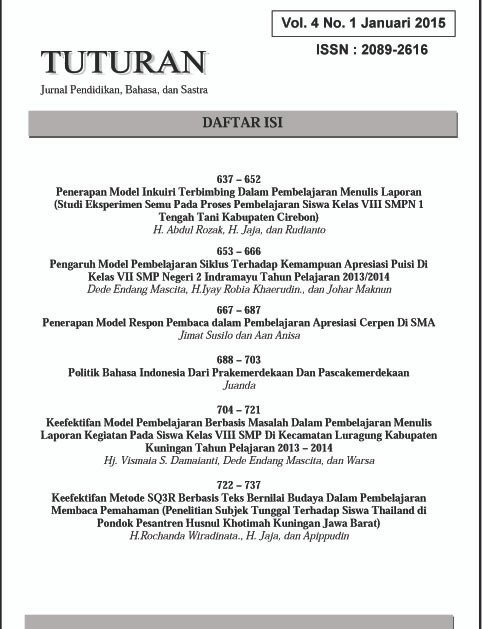PENGARUH MODEL PEMBELAJARAN SIKLUS TERHADAP KEMAMPUAN APRESIASI PUISI DI KELAS VII SMP NEGERI 2 INDRAMAYU TAHUN PELAJARAN 2013/2014
DOI:
https://doi.org/10.33603/jt.v4i1.842Keywords:
Models of Learning, Learning Model cycle, appreciation and poetryAbstract
This study focused on teaching model cycle capability poetry appreciation. This study aimed to describe the process of learning by using learning model cycle. Describe the activity of students in the learning cycle to learning poetry appreciation by applying the 5 stages: (a) generating interest (enggament), (b) exploration ( Exploration), (c) an explanation (explanation), (d) elaboration (elaboration), and evaluation (evaluation), and determine the effect on the ability of learning model cycle appreciation of poetry.
Based on the results of this study concluded 1) The process of learning poetry appreciation by applying the learning model cycle can improve student learning outcomes. 2) Activity of students in learning poetry appreciation by using the model of the cycle of learning can help students actively learn independently in groups , solve the problem of learning. Applying learning model cycle can assist students in learning menningkatkan understanding. 3) learning model cycle affect the ability of appreciation of poetry and effective against the appreciation of poetry. Applying learning model cycle is expected to help teachers and students to improve the quality of teaching so that learning objectives can be achieved the expected goals.
The data in this study of student understanding of the appreciation of poetry that includes elements that build the poem with assessment criteria include a general overview of the contents of understanding aspects of poetry, pemhaman tone, understanding feeling / sense, image understanding, understanding the style of language, understanding the message, understanding the content of the poem in life.
To test the hypothesis based on the assumption that different test results obtained from the initial ability appreciation of poetry and learning achievement as indicated by the value of pretest and post-test that includes testing the experimental classes and control classes.
Based on the analysis there are differences in pretest and post-test results of the experimental class, which is the result of the analysis, sig ( 2 - tailed ) < 0.05, then Ho is rejected and Hi which is the research hypothesis is accepted that effective learning model cycle of the ability of appreciation of poetry.
Applying learning model cycle is expected to help teachers and students to improve the quality of teaching so that learning objectives can be achieved.References
Ahmadi, A. dan Prasetya, J.T. (1997).Strategi Belajar Mengajar.Bandung: CV Pustaka Setia
Alwasilah, Ach (2004).Pendidikan Berpikir Kritis. UPI : Bandung.
Aminudin (Editor). (1990). Pengembangan Penelitian Kualitatif dalam Bidang Bahasa dan Sastra. Malang: HISKI dan Yayasan Asah, Asih, Asuh.
Aminudin, (2013). Pengantar Apresiasi Karya sastra. Bandung: Sinar baru Algensindo.
Arikunto.S (1998). Prosedur Penelitian Suatu Pendekatan Praktik. Jakarta: Nusa Indah.
Atmazaki. (1990). Sastra Teori dan Terapan, Padang: Angkasa Raya.
Budimansyah, Dasim (2007). Model Pembelajaran Portofolio. Bandung: PT. GeneSindo.
Efendi, S.(2002). Bimbingan Apresiasi Puisi. Jakarta : Bumi Aksara.
Gani Rizal.(2014). Kiat Pembascaan Puisi (Teori & Terapan). Bandung; Pustaka Reka Cipta.
Gultom,Syawal (2013). Materi Pelatihan Guru Implementasi Kurikulum 2013. Jakarta: Badan Pengembangan Sumber Daya Manusia Pendidikan dan Kebudayaan.
Heryadi,Dedi.(2007). Kemahiran Mengarang (Teori dan Pembelajaran). Tasikmalaya.
Huda, Miftahul (2013). Model-Model Pengajaran dan Pembelajaran.Yogyakarta: Pustaka Pelajar.
Kutha Ratna, Nyoman.(2011).Paradigma Sosiologi Sastra.Yogyakarta: Pustaka Pelajar.
Nunan, David. /Hidayat, Kosadi. (2009). Language Teaching/Metodologi Pengajaran Bahasa. Bandung: Yaf Publish
Nurgiyanto, B. (2000). Teori Pengkajian Fiksi.Yogyakarta: Gajah Mada.
Nursito.(2000). Ikhtisar Kesusastraan Indonesia Yogyakarta: Adicita Karya Nusa
Nursito.(2000). Ikhtisar Kesusastraan Indonesia.Yogyakarta :Adicita Karya Nusa.
Rampan,Korie Layun.(2013).Antologi Apresiasi Sastra Indonesia Modern. Jakarta: Narasi (Anggota IKAPI).
Sugiyono (2013). Cara Mudah Menyusun: Skripsi, Tesis, dan Disertasi. Bandung : Alafabeta, CV.
Sugiyono (2013). Metode Penelitian Pendidikan (Pendekatan Kuantitatif, Kualitatif, dan R&D).Bandung: Alfabeta CV.
Sukardi, HM.(2011). Evaluasi Pendidikan. Jakarta: PT.Bumi Aksara
Sumardjo ,Jakob & K.M., saini. (1988). Apresiasi Kesusastraan.Jakarta: PT.Gramedia.
Sutopo, Maryati.(2008) Bahasa dan sastra Indonesia Untuk SMP/MTs Kelas VII.Jakarta: Pusat Perbukuan, Departemen Pendidikan Nasional.
Suyatno. (2004). Teknik Pembelajaran Bahasa dan Sastra. Surabaya: SIC.
Suyatno. (2004). Teknik Pembelajaran Bahasa dan Sastra. Surabaya:Penerbit SIC
Waluyo, J. Herman. (1987). Teori dan Apresiasi Puisi. Jakarta: Erlangga
Wardani,I G.A.K (2001). Sistem Pembelajaran Bahasa Indonesia. Jakarta : Pusat Penerbitan Universitas Jakarta.
Wena, Made.(2009). Strategi Pembelajaran Inovatif Kontemporer. Jakarta:Bumi Aksara.
Downloads
Published
Issue
Section
Citation Check
License
The Authors submitting a manuscript do so on the understanding that if accepted for publication, copyright of the article shall be assigned to Jurnal Tuturan, Sekolah Pascasarjana Pendidikan Bahasa. Universitas Swadaya Gunung Jati as publisher of the journal. Copyright encompasses rights to reproduce and deliver the article in all form and media, including reprints, photographs, microfilms, and any other similar reproductions, as well as translations.
Jurnal Tuturan, Universitas Swadaya Gunung Jati and the Editors make every effort to ensure that no wrong or misleading data, opinions or statements be published in the journal. In any way, the contents of the articles and advertisements published in Jurnal Tuturan are the sole responsibility of their respective authors and advertisers.









